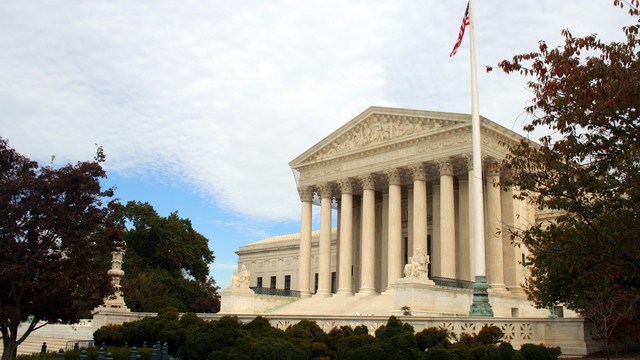 Liz Van Steenburgh/PhotoSpin
Liz Van Steenburgh/PhotoSpin
In a 5-4 vote on June 30, 2014 the Supreme Court ruled that the Affordable Care Act cannot require closely held, for-profit corporations to provide health insurance that covers contraception services for women when those services go against their religious beliefs, Time.com reported.
Hobby Lobby objected to paying for certain types of emergency contraception, including Plan B, Ella -- both commonly known as the morning after pill -- and two types of IUD (intrauterine device). The company believes these types of birth control amount to abortion. It did not object to covering other types of contraception, including birth control pills.
Women’s Health stated that Hobby Lobby asked for an exemption based on the Religious Freedom Restoration Act of 1993 (RFRA), which states that the government shall not substantially burden a person’s exercise of religion unless it is the least restrictive way to further a compelling governmental interest.
The Supreme Court ruling said that RFRA did apply to this situation, granting them the same contraceptive mandate compromise that has already been given to religious non-profits.
Most working women will probably see no effect from the ruling, according to corporate health benefits consultants, Al Jazeera America said.
However, the thousands of women employed by Hobby Lobby and cabinet maker Conestoga Wood, will be directly impacted, but experts said many other women might also feel the blow. That’s because this ruling may make it easier for other closely held, for-profit corporations to also ask for an exemption, according to Women’s Health.
In a majority opinion, Justice Samuel Alito, indicated that employees could still obtain the birth control coverage via an accommodation to the mandate that the Obama administration has already introduced for religious-affiliated non-profits.
The accommodation allows health insurance companies to provide the coverage without involving the employer in the process. Eligible non-profits must provide a self-certification authorizing insurance companies to provide the coverage.
Critics of the Supreme Court ruling said that even with this accommodation, it still may be difficult to acquire birth control. While some women can choose their employment based on health care benefits, geography and economic restrictions make that impossible for others, Time.com said.
The Supreme Court's decision won't change things for women seeking insurance coverage through the new health marketplaces via the Affordable Care Act.
“Women enrolling in coverage through a health insurance marketplace retain coverage for contraception as well as other preventive health care services,” Ron Pollack, Executive Director of Families USA, told CNBC.com.
The ruling may also reduce the use of IUDs as some privately held corporations may consider them a form of emergency contraception. This conflicts with health groups working to increase IUD usage as it has a lower failure rate than both the pill and condoms, according to the CDC.
Women’s rights groups said restricting insurance coverage for some types of contraception, or making coverage more difficult to obtain, could affect the amount of unintended pregnancies.
They pointed out that several studies have shown that greater access to contraception leads to fewer unintended pregnancies and reduces the number of abortions by 75 percent annually, Time.com said.
Sources:
Dockterman, Eliana. "5 Things Women Need to Know About the Hobby Lobby Ruling." Time. Time, n.d. Web. 1 July 2014. http://time.com/2941323/supreme-court-contraception-ruling-hobby-lobby/.
Fox, Maggie. "What the Hobby Lobby ruling really means." CNBC.com. N.p., n.d. Web. 2 July 2014. http://www.cnbc.com/id/101801129#.
Gengler, Amanda. "What the Supreme Court Contraception Ruling Means to You." Time. Time, n.d. Web. 2 July 2014. http://time.com/money/2940908/what-supreme-court-birth-control-ruling-means-to-you/.
Gueren, Casey. "What You Need to Know About the Supreme Court Birth Control Ruling in Favor of Hobby Lobby." womenshealthmag.com. N.p., n.d. Web. 2 July 2014. http://www.womenshealthmag.com/health/supreme-court-birth-control.
"SCOTUS: Religious employers can refuse to pay for birth control coverage | Al Jazeera America." SCOTUS: Religious employers can refuse to pay for birth control coverage | Al Jazeera America. N.p., n.d. Web. 1 July 2014. http://america.aljazeera.com/articles/2014/6/30/hobby-lobby-supremecourtdecision.html.
Reviewed July 3, 2014
by Michele Blacksberg RN
Keywords: Supreme Court ruling, Affordable Care Act, emergency contraception, birth control, insurance coverage, to provide the coverage, closely held for-profit corporations





Add a CommentComments
There are no comments yet. Be the first one and get the conversation started!